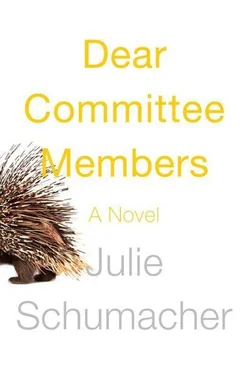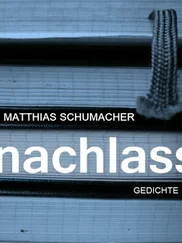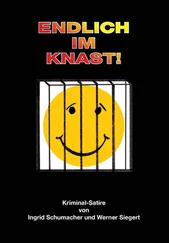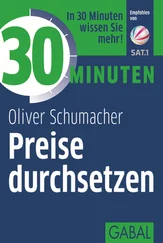I can think of no other student better suited to the halcyon tasks Ms. Barnes will so delightedly embrace should you decide to hire her. Fortunate girl: to behold her ambitions still winking before her like stars.
Loftily,
Jay Fitger
Professor of Creative Writing and English
Payne University
Carole Samarkind
Student Services/Fellowship Office
14 Gilbert Hall
Dear Carole,
Thank you for your letter. It was very kind. I wasn’t sure whether anyone else on campus, now that we have entered the summer doldrums, would have seen the notice in the paper. I almost missed it myself. I don’t always read the obituaries, though I suppose in another ten years that will be the page I turn to first, over morning coffee, for news of my friends.
I remember you telling me once that you counted it a good day, a promising day, when you skimmed the obits and found only notices for people over sixty-five. No babies, no college students, no teens. And you pointed out what should have been obvious: that in cases when the deceased is young, with no cause of death listed, the culprit is usually suicide or drugs.
With this letter I declare my intention to establish a scholarship in Darren Browles’s name. I spoke briefly to his parents about it, as much as decency would allow a week after his death. They have two other children, one in college, and they have no money to spare — but I see no reason why they would oppose an honorific named for their son. Carole, I know you’ve secured your new job — off to the Big Ten; congratulations! — but I hope you can help me with this final task before you go. I confess that Browles’s death has affected me severely, I am not in what you used to call “fighting form,” and I don’t want to spend loathsome hours battling the Kingdom of No in order to get this accomplished. The minimum to kick-start a scholarship, I understand, is $30,000. I’ll take the money out of my savings and retirement. I have no reason to retire anyway.
The last time I saw Browles he told me he was working on his book again. We had run into each other at the drugstore and I was struck by the tremor of liveliness in his speech. He said he was revising for the n th time, and he made a point of telling me that there was a piece of advice I’d given him in class last fall that was useful to him, and I felt glad to have been useful. He made a joke about inscribing the final words of the novel, if he ever finished it, into the flat of his desk. And I remember thinking — because we were pacing back and forth between the pain relief and the vitamins — that he must have gotten a windfall of new meds to be feeling so well. But of course that’s unfair.
You may want to know whether I told him about the HRH interview in Avenue A . In fact, I intercepted him a few minutes later on my way to the checkout, a collection of oddments tumbling in the plastic basket slung over my arm, with that purpose in mind. I touched his shoulder and noticed his wide-set eyes — one of them mildly strabismic — and a dried clot of saliva at the corner of his mouth. I was his advisor! It was my job to encourage and critique and suggest, to help him see his own project as if from a reader’s point of view. And I needed to be honest with him and to tell him that — regardless of my own machinations on behalf of the program, and irrespective of any demented remarks made by a formerly esteemed writer now poised at the edge of an open grave — his novel was not very good; the light of publication would not shine on the book in its current form. But how to phrase that particular failure, which I knew was not only Browles’s, but mine? I clutched the sleeve of his jacket, the rubber treadmill of the checkout rolling vertiginously at my side. “Are you all right?” Browles asked. “Professor?”
He always called me “Professor”; I don’t think he ever used my name. And standing there by the checkout, still gripping his jacket (the shoulder was torn, he probably couldn’t afford a new one), I saw him not as my only remaining graduate writing student but in his own terms, Darren Browles-as-Browles, the ding an sich.
Browles raised his arm as if to summon help, so I let go of his sleeve and muttered something about a forgotten prescription. And I walked away, telling myself that if he read the HRH interview he would quickly conclude that I had betrayed him; but at some future moment he might also understand that I had been trying, however ineffectually, to advocate for him and for other wannabe writers in the coming years.
As for the scholarship: I know that regulations and red tape thickly cover these things, but I would like to make this one as simple as possible. Call it the Darren Browles Memorial Fellowship, and let the interest pay out on a yearly basis to a student writer who, in no more than five hundred words, explains his or her artistic and financial need. My only other stipulation: there will be no letters of recommendation required or accepted. As long as I’m above ground, I’ll read the applications, names redacted, and decide.
I suppose this is the last letter of recommendation anyone will write for poor Browles, so let me say this about him. Socially, he was awkward — shy, I suppose — and his writing at times was subpar; but an idea had presented itself to him, knocking at his brain like a nighttime traveler, and instead of shutting the door in its face, Browles built it a fire, he drew a chair for it up to the hearth and spent half a decade trying to decipher and then convey what it struggled to tell him. He was patient and industrious and quietly determined. Buffeted by setbacks and rejection and his own limitations, he persevered. Furthermore, he was kind — an admirable person. I wish I had told him these things directly, rather than saving my praise of him for letters and e-mails sent to other people: a correspondence Browles would never benefit from or see.
One thing the obituary didn’t mention: he burned his work. He wiped six drafts of the novel off his computer and made a bonfire of the paper copies in an outdoor fire pit behind his apartment. He apparently explained as much to his family, in a note. “He said he didn’t want us to read what wasn’t finished,” his mother told me when we spoke on the phone. She asked if I’d read the book, and if it was good, and I told her it was.
Thanks for your attention to the scholarship, Carole. And thanks (in advance) for shielding me from the talons of the development office. Explain to them that I have not won the lottery, I did not inherit from an eccentric millionaire great-aunt, and I am not an ardent booster of this institution. (They ought to know that by now: I believe my reputation precedes me.) This is my one and only bequest, and it springs not from tenderness toward my employer but from belated love and admiration for Browles.
Let me know what other information you need, and I’ll try to get it to you ASAP, before you leave town and before the new semester begins. Though we in English are still in limbo as regards our new chair (Boti is AWOL, perhaps holed up in a cave with a pointed spear), we’ve been told that the heavy construction on the building will be finished this fall. In fact, yesterday I spotted an asthmatic Shakespearean and two balding Modernists, presumably ejected from the architecture building, ferrying their books and bits and bobs across the quad, a little ragtag caravan of refugees returning to their long-lost home. While the economists will wait until the fleurs-de-lis have been inscribed by master carvers on their office doors, we in English will probably spend another few months wearing hazmat suits and latex gloves. To wit: this morning, a workman politely knocked at my door to warn me about an orange electrical cord in the hallway — he didn’t want me to trip — but he neglected to mention that three feet beyond the electrical cord was a large receptacle sporting a sign marked WARNING: ASBESTOS.
Читать дальше
Конец ознакомительного отрывка
Купить книгу











